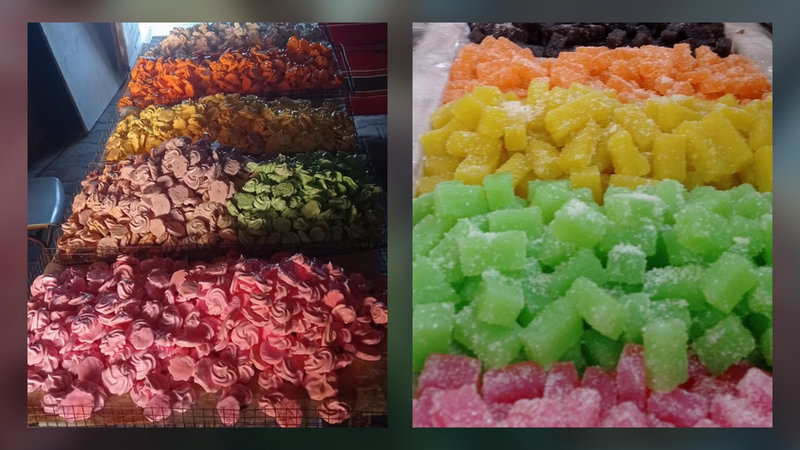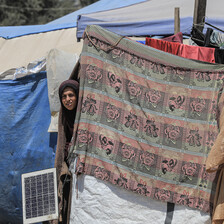The Electronic Intifada 21 February 2025

Sweets from the Mousa brothers.
On a wintry day in January in the heart of Khan Younis amid the bustling crowds of displaced families and locals, two brothers were hard at work making confectionery.
Their Zaman sweet “factory” – as it has become known – makes halqoum, a Turkish chewy candy, and a sweet called Al-Sadd Al-Ali (The High Dam), a name that reflects its structured appearance, like the Aswan High Dam along the Nile in Egypt.
Despite having no prior experience in the confectionery business, the two displaced brothers have strived to perfect the confectionery craft.
Ehsan and Ayman Mousa were once thriving tradesmen in Gaza. Ayman, 50, owned a carpentry workshop in Jabaliya, where he crafted custom furniture and managed a steady stream of orders. Ehsan, 49, was an in-demand electrical contractor specializing in wiring large stores and well-appointed homes in Gaza City.
“When the random bombing hit Jabaliya, my workshop was completely destroyed,” Ayman said about the Israeli military attack on 30 October 2023 that leveled his livelihood.
“All the tools and machines I had worked so hard to acquire were gone. Even if I returned to my workshop, it would be useless,” he said.
Without equipment or a place to work, Ayman was left with no income to support his family, his wife, four adult children and a 14-year-old son.
Ehsan said demand for his skills dried up as the Israeli attacks forced him to move to Khan Youis. With the Israeli aggression and power outages, “my expertise became irrelevant,” Ehsan told The Electronic Intifada. “I had no choice but to think of another way to provide for my family.”
Everyone affected
The loss of Ayman’s carpentry workshop is just a small part of the carnage Israel has visited on every part of the Gaza Strip.
According to a February World Bank report the damage to Gaza’s infrastructure and economy of Israel’s 15 month-long genocidal aggression has been “devastating.”
Putting reconstruction costs at over $50 billion, the Bank said every sector in Gaza, from health and education to agriculture and industry, had been all but decimated. The local economy, the report estimates, has contracted by 83 percent.
“It isn’t just numbers,” Ayman said. “Each factory or workshop destroyed has left families like mine without a livelihood.”
And the devastation was both professional and personal for Ehsan and his family.
“We lost everything. Our home in Sheikh Radwan was destroyed just a week into the bombardment,” Ehsan’s wife, Raida Bardawil, said in January from the tent in al-Zawaida, near Deir al-Balah in the central Gaza Strip, where the family has sought shelter.
“We lost our source of livelihood, and we had to start all over again,” she said.
Driven by a desire to stand on their own feet and support their families, the brothers decided to pool their remaining financial resources and start a business.
Their first attempt – making and selling chips in al-Zawaida – failed due to a lack of demand and little pedestrian traffic.
“We were starting from scratch, with nothing left but the will to survive,” said Ayman’s wife, Sonia Khalil Ghobain, from their tent not far from Ehsan’s family.
“Our family’s needs were overwhelming. Every little thing we used to take for granted was now a struggle to secure,” Sonia said.
Getting started
After a few months of trial, error and uncertainty, the two brothers opened their confectionery factory in Khan Younis in November 2024. They learned the craft through online tutorials and were fortunate to also have guidance from a relative in Gaza, candymaker Adam Zaino.
Despite the high costs of sugar, starch and other ingredients, the brothers persevered, driven by the belief that Khan Younis, with its larger population, would offer better opportunities.
They were right, they said, and customers praise the candies for their fresh and authentic taste.
Ehsan and Ayman work side by side every day, starting at 7 am and often not finishing until 11 pm.
“Even though we work long hours, all the exhaustion disappears when we see customers enjoying what we make,” Ehsan said. “Their smiles and appreciation make it all worth it.”
Ehsan’s eldest daughter, Aya Mousa, 25, said the first year after losing his source of livelihood was incredibly tough for her father, who had to adapt.
“He struggled with leaving behind the work he loved and excelled at.”
But now, she added, the business has brought a sense of normalcy and stability to the two families’ lives.
“Our lives have improved,” Aya said. “For the first time in a long time, we have a steady income and can meet our needs without asking for help.”
The brothers have been careful to ensure that their products are not too expensive.
“We don’t take advantage of people’s needs. The sweets we make are affordable. Even if this means earning less, it is okay. We all need to support each other.”
The business now produces about 15 to 20 kilograms of candy daily, but despite their success, Ehsan and Ayman both hope to return to their previous careers if the work opens up.
Jumana Taiseer is a writer in Gaza.




